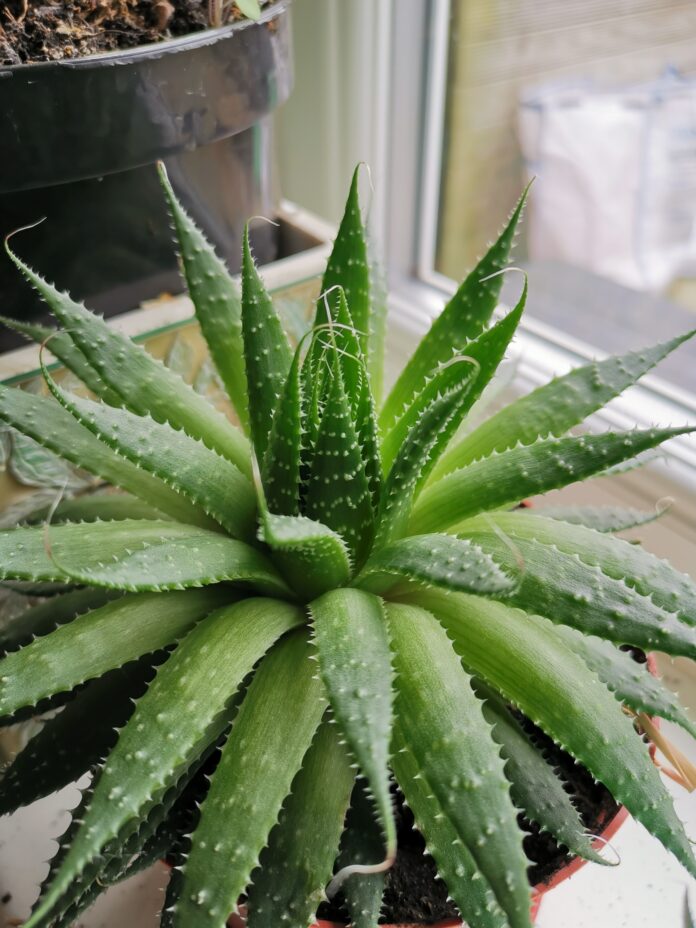Over the centuries, aloe vera has been used to treat a variety of conditions. The National Health Survey reported that 40% of Americans both, adults and children use complementary and alternative medicine every year. Aloe vera has a long history of providing incredible health benefits, and it is one of the most common herbal remedies used throughout the world. In this article, we will discuss all the benefits of aloe vera, the risks, and the side effects of this plant.
Anatomy Of The Aloe Vera
Aloe vera belongs to the Liliaceae plant family which has more than 300 varieties, depending on the climate and soil conditions of the place it grows. The benefits and side effects are depending on the type of aloe vera, and how much is used.
The aloe vera plant consists of green fleshy leaves that range in size from centimeters to meters of height. The plant can be used as a whole or by smaller sections. The outer leaf pulp is called the aloe vera latex. The inner leaf pulp is the aloe vera gel or filet. The anatomy of the leaf is relevant because of the benefits and toxicities associated with each layer.
Uses Of Aloe Vera
The aloe vera plant was known as the “plant of immortality” in early Egypt. Some benefits included the plant being fungicidal, antiviral, antibacterial, anti-inflammatory, antimicrobial, laxative, immunomodulating, and anticancer. Aloe vera was used as traditional medicine in Arab, Chinese, Greek, Indian, Japanese, Korean, and Roman cultures throughout the ages.
Nowadays, we can find aloe vera in various products from laxatives, lotions, shampoos, hair tonics, and makeup. Numerous studies have looked into proving the efficacy and side effects of this miraculous plant.
4 Benefits Of Aloe Vera & Corresponding Research
- Topical Benefits
Aloe vera gel has been used to heal wounds and burns for centuries. Recently the cosmetics community has gained interest in the plant as a moisturizer.
Many studies have shown the effectiveness of aloe vera to help repair wounds. In a study published in 2016 the effectiveness of aloe vera gel in second degree burns was compared to the most used cream for burns (Silver Sulfadiazine). The authors conclude that the burns treated with aloe vera healed 36% faster, the pain was gone 60% faster than in the control group, and 92% healed without any complications. The wound repairing properties of aloe vera goes from burns to scars including lesions on radiotherapy treated patients. The anti-inflammatory properties in aloe vera are key in the wound healing process.
A study published comparing the moisturizing effects of two lotions, the first of which had aloe vera gel, and the second did not. The lotion with aloe vera increased the content of water on the skin of its users. The same study report, the antimicrobial properties of aloe vera especially against bacteria growth.
Another use is for patients dealing with chronic skin conditions, like psoriasis. Although studies differ amongst them, most of them include that patients treated with lotions combined with aloe vera gel improved quicker than those who are not.
Aloe vera, although miraculous, needs to be handled carefully. Studies show positive results when using specific amounts of the plant, focusing only on the gel and the latex part of the plant instead of using the whole leaf. Aloe vera sold commercially has undergone a chemical process called decolorization this helps decrease the toxicity of the plant. When used in allergic patients or used in very concentrated levels, Aloe vera can cause a painful rash on the skin.
- Gastrointestinal Benefits
When it comes to the digestive tract, the aloe vera plant has many benefits. The most common one is when used as a laxative. Many laxative pills have aloe vera latex as a part of their component. It has been shown in humans and animals the positive effects of aloe vera consumption to stimulate softer stool. However, in 2002 the Federal And Drug Administration (FDA) issued a final rule stating the use of aloe vera as a non-prescription drug is no longer recognized safe. Studies have reported that the excess consumption of aloe vera is related to different types of cancer in the gastrointestinal tract.
Aloe vera has great benefits on gastric ulcers it can help them heal and protect against them. However, it does not affect ulcers produced secondary to alcohol.
- Anti-Diabetic Effects
Diabetes is a common condition characterized by high glucose levels in the blood and lower insulin levels (the hormone necessary to metabolize glucose). Studies have shown positive effects of aloe vera on diabetic patients when consumed orally in appropriate concentrations. Aloe vera lowered glucose, cholesterol, and triglycerides levels. An increase in insulin levels was noticed as well. When unprocessed or inappropriate concentrations are used, aloe vera can have the opposite effect on glucose and insulin levels.
- Anticancer Effects
Studies in rats have shown anti-tumor activity for aloe vera gel: tumor shrinkage, tumor necrosis, and prolonged survival rates. On the other hand, studies that have evaluated patients with prolonged consumption of raw, unprocessed aloe vera have shown a pro cancerous effect, developing tumors on the intestinal tract.
Proceed With Caution
Aloe vera is a miraculous plant with incredible benefits and a variety of uses. Like everything, balance is necessary. Consuming raw aloe vera can be dangerous. Many studies have proven the toxicity and pro cancerous properties of the plant. When used wrong, the plant has an opposite effect to the desired one, and it can be hazardous.
The toxicity of aloe vera is dose dependent, which means that high concentrations are necessary to become toxic. Another point is that not all aloe vera plants are the same. Each one of them has different properties, depending on where they grew up. Keep in mind that as tempting as it sounds, the benefits mentioned above are not present in all these plants.
The aloe vera products available to purchase on the market have processed aloe vera plant at safe concentrations. You should choose them over the raw plant. Keep in mind that this plant has systemic effects and that you should always consult your doctor first.





